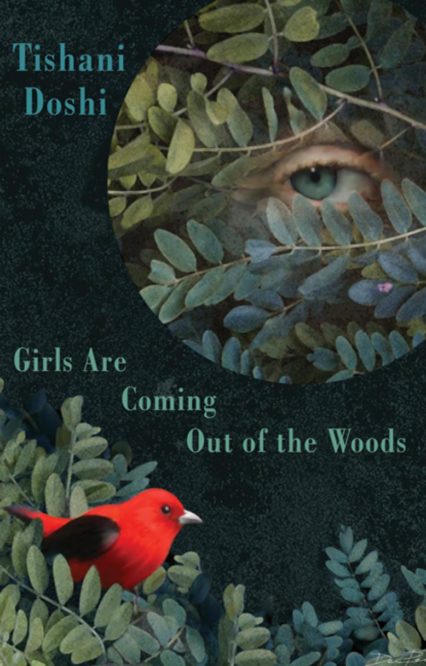
Frances Spurrier reviews Tishani Doshi’s Girls Are Coming Out of the Woods, a collection of poems that covers an array of topics.
Tishani Doshi’s use of language and imagery in Girls Are Coming Out of the Woods is dense, complex and stylistically clever enough to make the task of reviewing more difficult even than usual. Sometimes in poetry, ‘clever’ is a box of tricks with no real sense of structure and rhythm but not so in this case. Clever is more to do with, well, clever. In such a tight spot, it’s usually an idea to look at the book cover for a clue as to what others have said. Doshi is an ‘unashamed visionary’ announces poet John Burnside on the back.
I love Burnside’s work but I question whether visionaries have anything of which they need to be ashamed. Rumi was a visionary, wasn’t he? Perhaps Burnside meant that in this prosaic and technical old post-minimalist world, or whatever artistic age we are currently inhabiting, we like our death and mortality heavily disguised and our spirituality rationed. Visionaries see too much uncomfortable stuff and they see it in all the wrong places. Death is a natural part of life etcetera, etcetera, but too many deaths, too often, are unnatural. Particularly when the corpse is female. The poet’s job is to find the truth but at the end of the day, the truth can be a difficult place.
This is a health warning therefore for those that are squeamish about death – for whom earthly desires alone do a life make and please don’t confuse me with worrying about what comes next. The grim reaper stalks the pages of this book, with a determination which verges on the gleeful, to make us stare him in the face; to examine who called him up and who called time on time. Doshi calls the unaccountable to account.
Last year a young girl died for no reason. No reason except no-one seemed to know how to stop her from dying, least of all her family whom the police tried to blame before withdrawing that accusation.
That death has stayed with me.
Years ago at least two young girls had died in our locality, both blonde and teenaged. One night, I, sleepless and laden with an inexplicable sense of doom, paced up and down outside our house at half-past one in the morning waiting for my own daughter – my then-teenaged blonde, daughter – to return from a night out. I was relieved when she came into sight, walking from the direction of the station. But then a car approached from behind on the A316, veered in towards her and braked; I started running towards them, shrieking. I was there, I was able to run, and to shriek. In my dreams, I am still running. The driver caught sight of me and sped away. We came that close. That close to being a newspaper item.
I mention these things because Doshi is the poet of these girls, the newspaper items, the ones that died and the ones that survived, and all their terrified parents.
…and even though they have no names and some of them
have satin strips instead of faces, they all have stories …
until it is morning and they go wherever dead girls go
(Everyone loves a dead girl)
If Doshi is an unashamed visionary she is also an unashamed chronicler of abuse, rape, forced marriage and honour killings.
……….Girls are
coming out of the woods lifting
Their broken legs high, leaking secrets
From unfastened thighs, all the lies
whispered by strangers and swimming
coaches, and uncles, especially uncles
(Girls are coming out of the woods)
And what can be said about darkness after all?
About men who board buses with iron rods?
What can be said about the dragging and laying
of bodies to earth? Of landfills of lacerated breasts
And vaginal scree, of girls hanging from a mango tree?
(Meeting Elizabeth Bishop in Madras)
Yet there is much that is joyful and even humorous in these works. And the juxtaposition of words and images which in the hands of a lesser writer might clash like armies in the night somehow work for Doshi.
… How would you expound
on the aggression of sea anemones
The Battle of Plassey, Boko Haram?
Language is a peculiar destiny.
…. and God
walked among them, knitting sweaters
for injured chevaliers.
(A Fable for the 21stcentury)
Tishani Doshi’s work is like the music of Shostakovich; it gives no quarter but compels you to listen anyway and sometimes there is a beautiful lyricism to chase away the scary bits so that you think maybe you were wrong and the other bit wasn’t as scary as you thought even though you know it was, really. ‘Must it rain?/Yes! Now as the sky slips off/ the girders, revealing a secret garden./Light the rain falls. Light the dead.’ (Saturday on the Scores).
There are words and phrases that will stay with you long after you close the book. And yes, I know loads of reviewers say this and it isn’t always true but this time it really is true. The day after I finished writing this review I woke up with an insistent line in my head from ‘Meeting Elizabeth Bishop in Madras’. Based around the conceit of the dentist’s waiting room and staring at those garish ‘women’s’ magazines that only a dentist seems to be able to supply, in the second stanza the poet asks, with some justification: ‘What kind of fucked-up/message is: You can be your own Barbie?’
Tishani Doshi’s Girls Are Coming Out of the Woods is available now from Bloodaxe Books.
More work by Frances Spurrier is available here.











